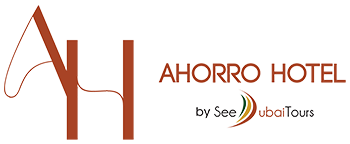Un momento por favor, estamos buscando los mejores precios




En cumplimiento con el deber de información recogido en el artículo 10 de la Ley 34/2002, del 11 de julio, de Servicios de la Sociedad de la Información y Comercio Electrónico (LSSICE), a continuación se reflejan los siguientes datos:
1. Domicilio a efectos de notificaciones en España: Calle de los Aparejadores nº3 19003 Guadalajara
2. Buzón de contacto: soporte@ahorrohotel.com.
3, Como titular responsable de los ficheros automatizados derivados de dicho website, AHORRO HOTEL BY SEE DUBAI TOURS SLU desea poner en conocimiento de los visitantes y usuarios de su página web su política de protección y tratamiento de datos de carácter personal, que será aplicable en caso de que los usuarios decidan rellenar algún formulario de www.ahorrohotel.com donde se recaben datos de carácter personal, sin perjuicio de lo indicado en la Cláusula de Privacidad aplicable a cada formulario concreto. En cualquier caso, AHORRO HOTEL BY SEE DUBAI TOURS SLU garantiza en todo momento el íntegro y pleno cumplimiento de las obligaciones dispuestas por la Ley Orgánica 15/1999, de 13 de diciembre, de Protección de Datos Personales, así como las dispuestas en el Real Decreto 994/1999, por el que se aprueba el Reglamento de Medidas de Seguridad así como el resto de normativa de desarrollo.
4. Los datos de carácter personal que sean facilitados por los usuarios o visitantes del website serán incluidos en un fichero automatizado cuyo responsable es AHORRO HOTEL BY SEE DUBAI TOURS SLU con la finalidad de facilitar el acceso a los contenidos ofrecidos a través de la página web; prestar, gestionar, administrar, ampliar y mejorar los servicios y/o contenidos ofrecidos en la página; adecuar dichos servicios a las preferencias y gustos de los usuarios; el estudio de la utilización de los servicios por parte de los usuarios y visitantes; la gestión de incidencias y mantenimiento de la página web; así como con fines publicitarios y de prospección comercial respecto de productos y servicios de AHORRO HOTEL BY SEE DUBAI TOURS SLU.
5. AHORRO HOTEL BY SEE DUBAI TOURS SLU informará a los usuarios y visitantes de la página de la obligatoriedad o no de facilitar todos y cada uno de los datos de carácter personal que le sean solicitados en los formularios de acceso y registro a los servicios y/o contenidos ofrecidos en la página web. El aviso se realizará en el momento de recogida a través de avisos visuales tales como ventanas flotantes, colocación de asteriscos o símbolos junto al dato solicitado, o medios análogos a los anteriormente citados. En cualquier caso, la negativa a suministrar los datos personales solicitados, la entrega de datos inexactos o de datos incompletos, podría ocasionar la prestación inadecuada, ineficiente, defectuosa o la no prestación de los servicios y/o contenidos ofrecidos a los usuarios y visitantes.
6. AHORRO HOTEL BY SEE DUBAI TOURS SLU solicitará a los usuarios y visitantes de la página web su autorización expresa en cada formulario que cumplimenten para la cesión de los datos de carácter personal que faciliten a las entidades pertenecientes a AHORRO HOTEL BY SEE DUBAI TOURS SLU para el envío de información y publicidad. El visitante y/o usuario podrá oponerse a esta cesión tanto en el formulario que deberá cumplimentar inicialmente, como en cualquier momento posterior, enviando, en este último caso, su solicitud al correo de contacto: soporte@ahorrohotel.com
7. AHORRO HOTEL BY SEE DUBAI TOURS SLU puede modificar esta Política de Privacidad en función de exigencias legislativas, normativas o con la finalidad de adaptar dicha política a las instrucciones dictadas por la Agencia Española de Protección de Datos, por ello se aconseja a los usuarios que la visiten periódicamente.
8. AHORRO HOTEL BY SEE DUBAI TOURS SLU tiene plena conciencia del uso y tratamiento que se debe dar a los datos personales que se puedan requerir o que se puedan obtener de los usuarios en sus páginas web con el fin de gestionar los servicios ofrecidos o para remitirles comunicaciones comerciales de productos o servicios que puedan resultar de su interés.
9. AHORRO HOTEL BY SEE DUBAI TOURS SLU adoptará las medidas de índole técnica y organizativa necesarias para garantizar la seguridad de los datos de carácter personal y evitar así su alteración, pérdida, tratamiento o acceso no autorizado, habida cuenta del estado de la tecnología de acuerdo con lo establecido por el Reglamento de Medidas de Seguridad de los ficheros automatizados que contengan datos de carácter personal aprobado por el Real Decreto 994/1999, de 11 de julio.
10. Los usuarios responderán, en cualquier caso, de la veracidad de los datos facilitados y se hacen responsables de comunicar a AHORRO HOTEL BY SEE DUBAI TOURS SLU cualquier modificación en los mismos, quedando AHORRO HOTEL BY SEE DUBAI TOURS SLU exento de cualquier tipo de responsabilidad a este respecto a través del correo de contacto: soporte@ahorrohotel.com.
11. Los usuarios tienen reconocidos y podrán ejercitar los derechos de acceso, cancelación, rectificación y oposición, mediante comunicación escrita a las direcciones indicadas en cada caso o a la dirección: soporte@ahorrohotel.com.
12. AHORRO HOTEL BY SEE DUBAI TOURS SLU no remitirá mensajes no solicitados ni consentidos previamente ni enviará cadenas de mensajes electrónicos no solicitados ni previamente consentidos. AHORRO HOTEL BY SEE DUBAI TOURS SLU informa a los usuarios que, podrán oponerse al envío de mensajes comerciales siguiendo las instrucciones indicadas en cada caso o comunicándolo por escrito al correo de contacto: soporte@ahorrohotel.com.
13. En relación con los datos personales de menores de 18 años, AHORRO HOTEL BY SEE DUBAI TOURS SLU nunca utilizará estos datos para fines inadecuados para la edad del menor, sino que lo hará en consonancia con la edad, conocimiento y la madurez de este público objetivo, y nunca recabará datos relativos o relacionados con la situación económica o la intimidad de los miembros de su familia. AHORRO HOTEL BY SEE DUBAI TOURS SLU facilitará a los padres o tutores la posibilidad de que puedan ejercer los derechos de acceso, cancelación, rectificación y oposición de los datos de sus hijos o tutelados y animará a los menores a que consulten con ellos antes de proporcionar datos. En caso de tratarse de menores de 14 años, estos deberán aportar a AHORRO HOTEL BY SEE DUBAI TOURS SLU autorización escrita de sus padres, tutores o representantes legales, consintiendo el tratamiento de sus datos.
La empresa titular de la website (www.ahorrohotel.com) es AHORRO HOTEL BY SEE DUBAI TOURS SLU con domicilio fiscal en Calle de los Aparejadores nº3 19003 Guadalajara en España provista de Número de Identificación Fiscal B75554865. Registrada en el Registro Mercantil de Guadajara, Hoja: GU-12807 Folio electrónico IRUS 1000437160676. Copyright © 2025 Todos los derechos reservados.